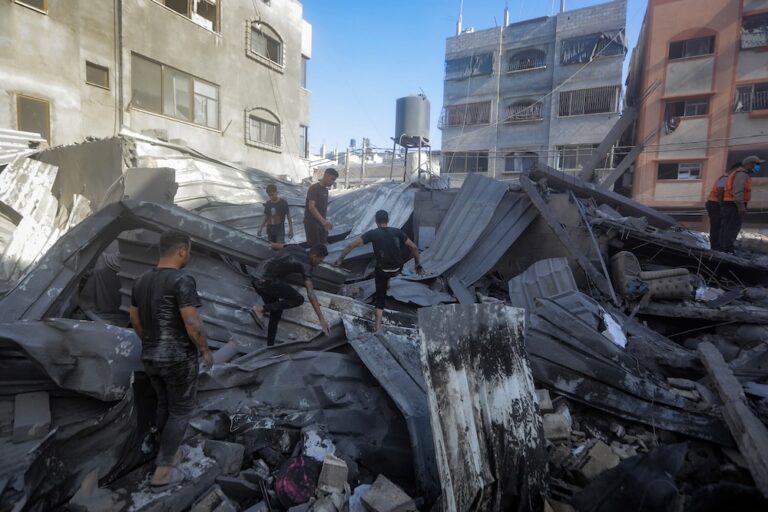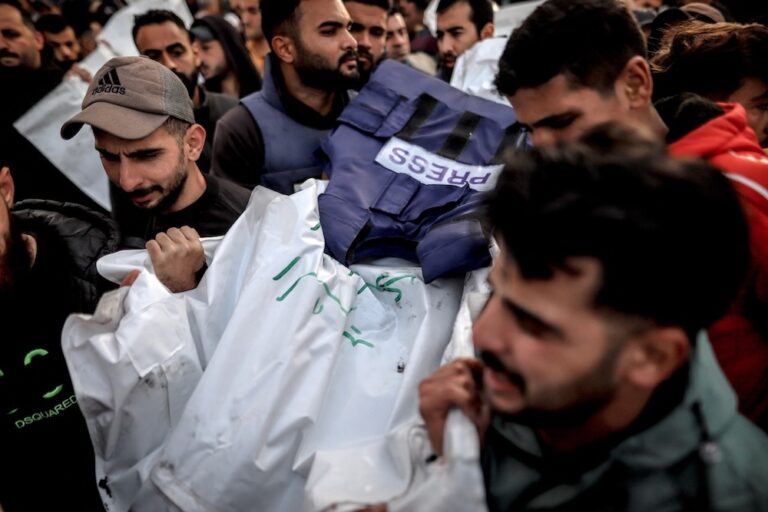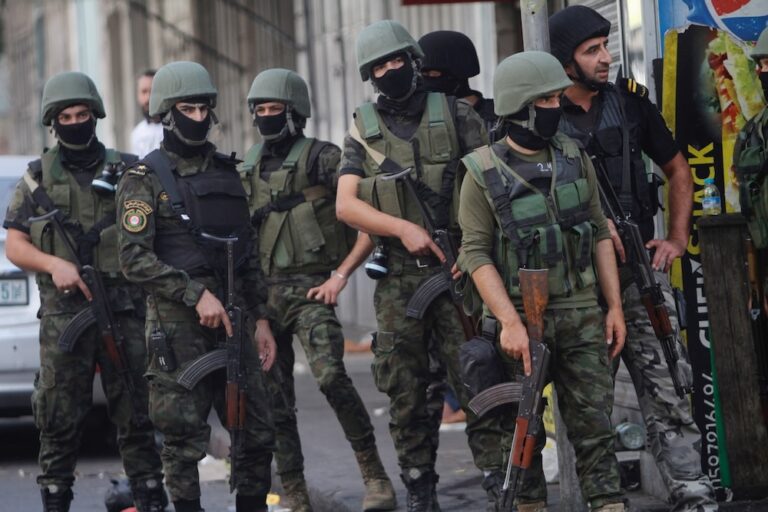(RSF/IFEX) – The following is a 7 April 2002 RSF press release: Unprecedented deterioration in press freedom 7 April 2002 Occupation of Palestinian towns and cities Unprecedented deterioration in press freedom Since Israel began its offensive against towns and cities administered by the Palestinian Authority 10 days ago, there have been about 40 cases of […]
(RSF/IFEX) – The following is a 7 April 2002 RSF press release:
Unprecedented deterioration in press freedom
7 April 2002
Occupation of Palestinian towns and cities
Unprecedented deterioration in press freedom
Since Israel began its offensive against towns and cities administered by the Palestinian Authority 10 days ago, there have been about 40 cases of journalists being obstructed in their work (wounded, injured, arrested, expelled or threatened).
The Israeli army is knowingly targeting journalists in a deliberate policy of intimidation. The Israeli authorities are treating many journalists as “enemies” and accusing them of being “Palestinian sympathisers.” They are also doing everything they can to hide their military operations and accompanying abuses from the world’s media.
Attacks on press freedom have increased in recent days. Since Israel declared Ramallah a “closed military zone” on 31 March, journalists have found it harder to do their job. They have been arrested, threatened, roughed up, hindered in their movements, expelled, wounded or injured and had their accreditations or passports confiscated as part of efforts by the Israeli authorities to restrict the free flow of information.
Israel has signed and ratified the International Covenant on Civil and Political Rights, Article 19 of which guarantees the “freedom to seek, receive and impart information”. But the Israeli army is trying to prevent journalists from reporting freely on its latest offensive. The press freedom situation has deteriorated as never before in Israel’s history.
At least five journalists have been wounded since 29 March. They include Carlos Handal, a cameraman for the Egyptian Nile TV station, Anthony Shahid, an American correspondent for the US daily The Boston Globe, Majadi Banura, a cameraman for the Qatari TV station Al-Jazeera, Iyad Hamad, a Palestinian working for APTN, and Jérôme Marcantetti, a cameraman for the French TV station LCI.
At least eight Palestinian journalists have been arrested. Hamdi Farraj, head of the Palestinian TV station Al-Rouah, said two of his journalists, Ashraf Farraj and Jalal Hameid, arrested on 3 April, are still being detained. Some Palestinian journalists have been roughed up or humiliated. Atta Iweisat, a photographer working for the Israeli daily Yediot Aharonot and the Gamma agency, was arrested by Israeli soldiers who said he was not properly accredited. He was held for more than an hour, on his knees, in the rain, head down and hands tied behind his back. In Ramallah, two cameramen working for Reuters and MBC were forced at gunpoint to undress in the middle of the street during a security check.
About 20 journalists have come under fire. At least four shots were aimed at Nasser Nasser, a photographer working for the Associated Press, who was taking pictures of armoured vehicles in Ramallah. Warning shots were fired at a foreign press convoy of seven armoured vehicles on their way to cover the arrival of US mediator Anthony Zinni at Palestinian President Yasser Arafat’s headquarters and five stun grenades were thrown at them. When the convoy turned round, the CNN vehicle was hit by a bullet that broke the rear window. The City Inn Palace Hotel in Ramallah, where many journalists are based, is regularly the target of gunfire.
Countless journalists have been prevented from moving about. A group of Italian journalists was trapped for nearly a day in a convent near the Church of the Nativity in Bethlehem. Four Turkish journalists were held for several hours in the press centre in Ramallah by Israeli soldiers who searched them and seized their passports, preventing them from leaving the building. British journalist Inigo Gilmore, of the Sunday Telegraph, had his passport confiscated for 24 hours by Israeli troops in Ramallah. In each case, the situation was only resolved after intervention by the governments of the journalists’ home countries.
The Israeli government press office cancelled the accreditation of two journalists from Abu Dhabi TV, who were accused of broadcasting “anti-Israeli propaganda.” One of them, Jassim al-Azzawi, was expelled. The press office also wrote to the local bureau chiefs of the US networks NBC and CNN, accusing them of flagrantly defying army orders by working in closed military zones.
The Palestinian media have once more been the target of the Israeli army. On 30 March, Israeli soldiers entered the main building of the Palestinian radio and TV station The Voice of Palestine, which then had to end its broadcasts from Ramallah. The soldiers ordered four journalists inside to leave their offices. The Ministry of Culture building in the city, which housed a local radio and TV station, was also occupied. Israeli troops entered another building where several Palestinian and foreign media, including Reuters, have their offices.
These restrictions on the media are not just recent. Since the start of the second Intifada, in September 2000, Reporters Without Borders (RSF) has counted 53 cases of journalists wounded by gunfire. In the vast majority of cases, RSF has found that the shooting came from the Israeli side. Some of the journalists were seriously wounded, even though several of them were clearly identifiable as press and standing some distance from clashes taking place. Very few serious investigations have been made into these incidents and very few of those responsible punished. An Italian photographer, Raffaele Ciriello, was killed on 13 March by shots fired from an Israeli tank in Ramallah.
This year, less than half of all Palestinian journalists have been allowed to renew their Israeli press cards. Fawaz Kamal, of the Arab press department in the Israeli government press office, said fewer than 300 were accredited this year, compared with about 600 last year. For example, Awadh Awadh, who works for the French news agency AFP, was turned down for “security reasons.” In other cases, the authorities have simply said the application is “under consideration.” Some journalists have only been able to get accreditation for a few months instead of the standard two years and others have only been able to get a new permit meant for media assistants. Accreditation is indispensable for any movement between Israel and the different territories.
For the first time since Reporters Without Borders began working in Israel, the government press office refused on 5 April to give accreditation to Reporters Without Borders journalists. Press office spokesman Danny Seaman said this was because the organisation had become “political” since adding Israeli army chief of staff General Shaul Moffaz to its worldwide list of press freedom predators last November.
Reporters Without Borders condemns the behaviour of the Israeli army and the decision to bar the media from certain areas. These steps, unprecedented in scale since the start of the second Intifada, are a new attack on press freedom in the Occupied Territories. Reporters Without Borders calls on the Israeli civilian authorities to reverse these decisions at once and urges the international community to increase its pressure on Israeli officials to ensure that the media can report freely on the current situation. This is the only way to avoid rumours and false information.
Reporters Without Borders asks the Israeli authorities once again to conduct serious and impartial inquiries into all cases of journalists killed or wounded since September 2000 and take the necessary steps to punish those responsible for these abuses. Reporters Without Borders has already repeatedly deplored the lack of serious investigation into these incidents but there has been no response.
Reporters Without Borders urges the Israeli authorities to uphold their international commitments to respect press freedom, which must include freedom of movement for all journalists – foreign correspondents and Israeli and Palestinian journalists – and a system of accreditation that ends the current arbitrary attitude of the government press office.
Jerusalem, 7 April 2002


